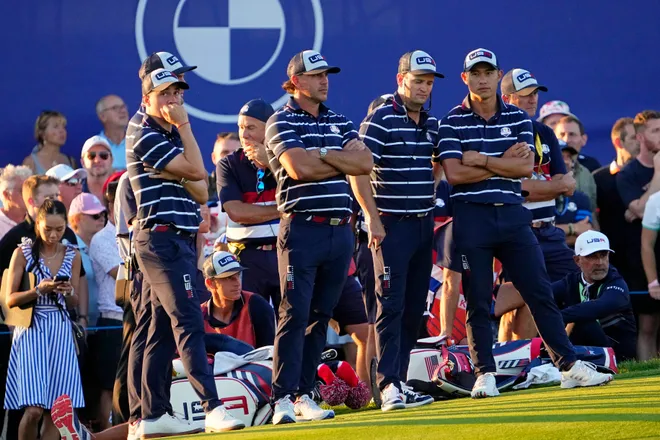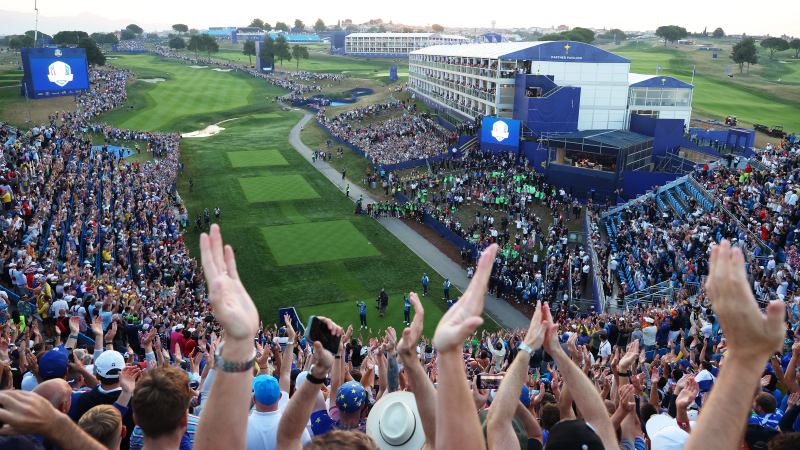Europe masterful at Ryder Cup format. There's nothing Americans can do to change that
The easy column to write about the Americans’ performance on Day 1 of the Ryder Cup would be a raging screed about how much more the Europeans care or the lineup choices of captain Zach Johnson and demand a complete overhaul of how our country approaches this unique event.
But let’s be honest, we’ve done that before.
And it hasn’t helped, at least when the Cup is being contested on European soil.
So maybe it's time to just accept what seems evident from what’s shaping up as another blue-and-gold rout across the pond: They’re just better than us at this format, especially at home, and sometimes there's not much you can do other than applaud and shrug.
What’s the point of scolding Johnson when Jon Rahm holes out three times from off the green in one day and then sinks a stone-cold 33-footer for eagle on the 18th to steal a tie from five-time major winner Brooks Koepka and No. 1 ranked Scottie Scheffler?
RYDER CUP UPDATES: Ryder Cup live scores, pairings, schedules and more.
Who do you hold accountable for Viktor Hovland becoming one of the most clutch players in the world? What are you supposed to do when Rory McIlroy and Matt Fitzpatrick shoot 9-under on their first 10 holes?
That’s not to suggest what happened Friday is acceptable. A 6½-1½ lead for Europe marks the most disastrous day for American golf since 2012 when they led 10-6 going into singles and got whomped at Medinah Country Club.
But it’s also a phenomenon that no amount of task forces or analytics or carefully planned preparation can prevent. The Ryder Cup is a long windup of hype and anticipation and analysis that all goes out the window when those towering stands above the first tee get filled to capacity.
In the end, it’s terrifyingly simple: Who is going to play better golf that particular weekend?

Accepting that is perhaps the Americans’ biggest problem in this event. Every time they lose one of these, it seems like a two-year Easter egg hunt to figure out why and what formula they need to prevent it from happening again.
But maybe the real answer is that there is no answer. Aside from one or two quibbles on the margins, there isn’t a lineup combination or a different system of choosing the U.S. team that could have prevented what happened Friday. Europe was just that good.
A caveat, of course. This competition isn’t over. Europe needs eight more points out of the 20 remaining, which is not automatic but certainly makes a U.S. comeback unlikely. Unless the Americans come up with something special on Saturday, it’s all going to be academic by the singles competition, which is where the Americans typically count on making up ground.
The more likely outcome is that Europe rolls through the weekend just like it did two years ago in France, which would mark its seventh straight victory on the continent. Over the same period, the U.S. is just 4-3 in Ryder Cups at home.
That’s a big difference, and it leads to a lot of hand-wringing about what they're doing right and what the U.S. system is doing wrong.
But that wasn’t the narrative two years ago when the U.S. team ran away with it at Whistling Straits, 19-9. In fact, it looked like a potential turning point in this event with so many young Americans carrying that team and the older generation of European stars like Sergio Garcia and Ian Poulter fading out of the picture.
Anyone arguing, though, that there was some major systemic change on either side in the last two years is probably overthinking it. For the U.S. and Europe, seven of the 12 players are the exact same as they were two years ago.
On paper, the Americans brought over an even stronger team than the one two years ago by adding a U.S. Open champion (Wyndham Clark), a British Open champion (Brian Harman) and six-time PGA Tour winner Max Homa. That’s 10 of the top 20 players in the world. You can't really put a better team together based on week-to-week performance.
But the Ryder Cup isn’t a week-to-week event. It’s a one-weekend snapshot of golf in an unusual format with unfamiliar pressures.
Last time, the Americans’ workhorses like Collin Morikawa and Patrick Cantlay dominated while Europe didn’t get very good performances out of McIlroy, Fitzpatrick and Hovland. On Friday, it was the reverse with a few American guys playing below their standard and Europe’s stars making almost every big putt.
If you want to be super critical, Jordan Spieth disappearing down the stretch in afternoon four-ball probably cost the U.S. half a point. Homa and Clark were two up with two to play and ended up halving the match, which was a major disappointment. But even if you give the U.S. that extra point, it would still be a bleak picture going into Saturday.
Because this event is such a one-off, it lends itself to over-analysis and second guessing. Should Johnson have sent Spieth and Justin Thomas, a team with a successful Ryder Cup track record, out in both sessions rather than just the afternoon? Should he have picked Lucas Glover or Keegan Bradley instead of Sam Burns? Was it a mistake to send out Morikawa for both sessions when his form was iffy this summer?
These are all fair questions in light of the scoreboard, but if you actually watched the matches it’s hard to find a ton of fault with how the U.S. played.
Scheffler and Koepka went 8-under on the back nine in four-ball and had to settle for half a point because Rahm eagled No. 16 and No. 18, finishing with a putt that hit the back of the hole like a freight train and bounced right into the bottom.
Scheffler and Burns didn't make a single bogey in alternate shot and got overwhelmed 4&3. Hovland started his day with a seemingly impossible pitch-in from the fringe for birdie and ended it with a double-breaking uphill 26-footer that went in on the final rotation of the ball. Sure, Clark could have put the hammer down on No. 18 to get a full point after a perfect drive but Justin Rose still had to get up-and-down for birdie from 126 yards away, including a clutch 8-foot putt.
Assuming the event continues on this trajectory, the U.S. team can spend the next two years looking for the next analytic that will solve its Ryder Cup problems or hope that its next captain has some type of revolutionary system for putting the pairings together.
Or it can do what Europe did after getting its rear end kicked last time: Play better.
Follow USA TODAY Sports columnist Dan Wolken on X @DanWolken

Disclaimer: The copyright of this article belongs to the original author. Reposting this article is solely for the purpose of information dissemination and does not constitute any investment advice. If there is any infringement, please contact us immediately. We will make corrections or deletions as necessary. Thank you.







